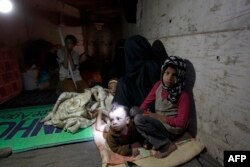Airstrikes and artillery fire rocked the Yemeni city of Aden overnight as combatants vied for control of the main airport in fighting that residents have called the worst in more than a month of war.
Iran-allied Houthi rebels and local militiamen traded tank and mortar salvos in the Khor Maksar district near the airport from Wednesday evening into Thursday and warplanes from a Saudi-led coalition of Arab states bombed Houthi positions.
On the frontier with Saudi Arabia, a shell fired from Yemen killed a patrolling Saudi border guard on Thursday morning, the kingdom's Interior Ministry said, bringing the number of Saudi casualties in the campaign to 11.
Residents said dozens of families fled, braving Houthi sniper fire and checkpoints as homes were shelled and burned.
"The scene is disastrous, not just in the streets where fighting is going on but inside houses where families are often trapped and terrified," local activist Ahmed al-Awgari said.
"Women and children have been burnt in their homes, civilians have been shot in the streets or blown up by tank fire," he added.
Scores of residents and fighters from both sides have been killed throughout the conflict, and residents said at least six Houthis and two local militiamen were killed overnight.
The Houthis hail from Yemen's far north and belong to the Zaydi sect of Shi'ite Islam. They swept into the capital, Sanaa, in September and pushed south and east, saying they were winning a revolution against Sunni militants and corrupt officials.
But their push into the outskirts of the southern city of Aden on March 25 triggered a Saudi-led air campaign to drive them back and aid local fighters.
The Sunni kingdom believes the Houthi group is a proxy for Shi'ite Iran, and Saudi backing for the resistance in Yemen's mostly Sunni south has raised fears that Yemen could descend into all-out sectarian war.
Militant Sunni groups have consolidated their position in eastern parts of Yemen since the fighting began and on Thursday an Islamic State group in the country released a film it said showed the killing of 14 Yemeni soldiers, the SITE Intelligence monitoring service reported.
Yemen's vice president-in-exile, Khaled Bahah, said the breakdown of Yemen's military during the conflict was helping al-Qaida in the Arabian Peninsula, the most active branch of the global militant group, and said the Houthis were not confronting them.
"All we're seeing is them making war on the Yemeni people, not al-Qaida," Bahah told Qatar-based al-Jazeera TV. "Al-Qaida has advanced and taken some positions in Yemen because of the security and military vacuum."






